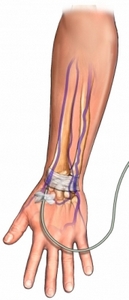Beskrovnaya surgery
Description bloodless surgery
Bloodless surgery avoids blood transfusion. Objectives bloodless surgery include:
- Save and re-use the patient's own blood (instead of donated blood);
- Use medications, that will improve the patient's blood reproduction;
- To minimize blood loss.
Reasons for bloodless surgery procedures
The lost blood during surgery is replaced by blood transfusion donor. Nonetheless, patient, perhaps, I do not want to receive blood transfusions. The reasons may be:
- Concerns about blood-borne diseases (eg, HIV, hepatitis);
- Complications from a blood transfusion;
- Religious beliefs.
Bloodless surgery – option for those, who do not want or can not use the donated blood.
In the application of bloodless surgery has some advantages:
- The recovery time after surgery will;
- Less time spent in hospital;
- Rapid wound healing;
- Less complications of blood transfusion.
Possible complications during bloodless surgery
Complications after a bloodless surgery can include negative reactions to medications, liquids and other methods of, used to prepare the patient for the procedure.
If you plan to use bloodless surgery, the doctor will review a list of possible complications, focusing on the type of surgery and the patient's overall health.
Smoking can increase the risk of complications. The doctor may ask the patient to quit smoking.
How is bloodless surgery?
Before the procedure
The doctor performs the following actions:
- Learning history and conducting a physical examination of the patient;
- Assigns necessary tests;
- It gives instructions for patient preparation for surgery.
The doctor will use a patient's own blood, if you need a blood transfusion. To prepare for this nurse would select and store the blood of the operated. For substitutions may introduce the necessary fluid through the needle into the vein (intravenously), to replace the selected blood.
They can be assigned to treatments to enhance recovery of the operated blood. These procedures may include:
Diet
- We need to eat foods high in iron and / or taking supplements, to increase the amount of iron in the blood. Iron is an important component of blood;
- You need to eat foods high in vitamin C, since this vitamin helps the blood to absorb iron;
- We need to take folic acid.
Drugs
Your doctor may give the patient medication to improve reproduction and blood clotting. It is also possible you need to stop taking certain medications, herbs or supplements:
- Aspirin and other nonsteroidal anti-inflammatory drugs (NSAIDs);
- Blood-thinning drugs;
- Antiplatelet drugs.
Oxygen
Oxygen plays an important role to deliver oxygen to the body's cells. The greater the blood loss during surgery, the less oxygen is supplied to the correct functioning of the body.
To prevent falling oxygen levels, your doctor may “pump” blood supplemental oxygen. Therefore, even when blood loss, leftover blood will have an extra supply of oxygen to support body functions.
To “pump” additional oxygen to the patient's blood is placed in a pressure chamber with oxygen. This sealed chamber with the air, which has a very high concentration of oxygen. You will need to lie on a soft table and breathe normally. This painless process.
Anesthesia
Anesthesia It can be used to block pain and patient support dormant during operation.
The anesthesiologist will monitor your body temperature and blood pressure. It can lower the temperature or blood pressure below normal, as it is a way to slow or limit loss of blood during surgery.
Procedure bloodless surgery
What happens during the procedure depends on the type of operation and many other factors.
Your doctor may decide to minimally invasive surgery. This involves making a small incision and using small tools for surgery. Open surgery, on the other hand, It leads to increased blood loss, because it will be made more cuts.
To further minimize blood loss, doctor makes the following:
- Limit the amount of blood, taken for analysis;
- Apply the medication to increase the blood flow and the amount of oxygen in the blood;
- Uses special surgical instruments to stop the bleeding.
The doctor may also collect blood, Using a special device, Cell Saver. This unit will suck, clear, and filter blood during surgery, so that it can be reintroduced into a patient, if necessary.
Immediately after the procedure bloodless surgery
If surgery is necessary blood transfusions, doctor reuses blood, which has been collected in advance, before the operation.
Patients may be administered a special liquid, containing the components, isolated from its blood. Operable can be placed in the chamber with oxygen, to increase the amount of oxygen in the blood.
How long does the procedure bloodless surgery?
Depending on the type of operation.
Beskrovnaya surgery – will it hurt?
Anesthesia prevents pain during surgery. Pain or soreness during recovery after surgery will be reduced with the help of painkillers.
The average hospital stay
How long the patient remains in the hospital depends on the type of operation. Sometimes it is possible to leave the hospital the day of surgery. We need to talk to your doctor, To make sure, what is possible.
Patient care after the bloodless surgery
In the hospital
The patient was sent to the recovery room, where medical staff will monitor vital signs.
Home Care
After leaving the hospital the doctor will give instructions on how, how to care for yourself at home. These may include instructions on Diet, Physical Activity, taking medications, lifestyle, and receiving the soul.
Emergency situations after bloodless surgery
After arriving home immediately to contact a doctor if the following symptoms:
- Signs of infection, including fever and chills;
- Redness, edema, increased pain, severe bleeding, or discharge from the incision;
- Nausea and vomiting;
- Pain, that does not go after the adoption of painkillers;
- Cough, shortness of breath or chest pain;
- Dizziness and weakness;
- Pain, burning, frequent urination or presence of blood in urine;
- Other unpleasant symptoms.
In an emergency, you should immediately call an ambulance.

